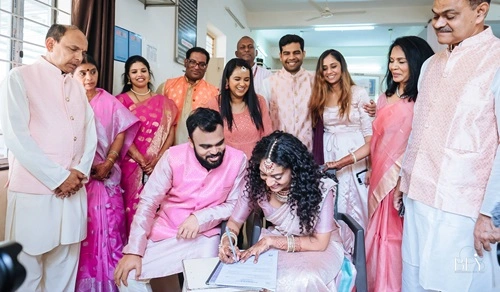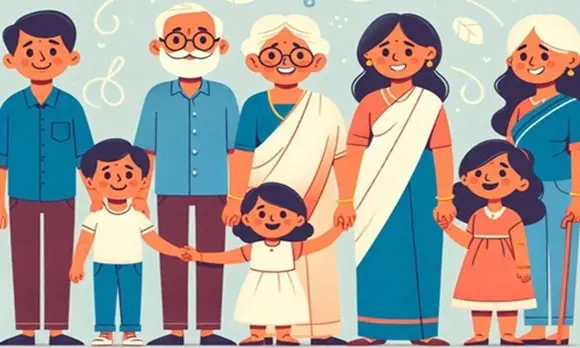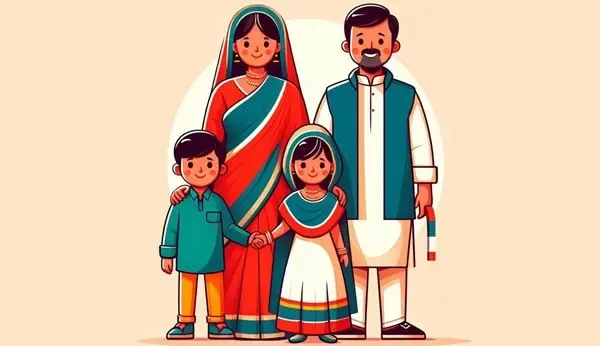Court marriages are legal contracts that allow two people to marry without having to go through excessive marriage celebrations and religious marriage ceremonies. Court marriages can be performed in any jurisdiction, as our constitution allows any Indian male and female to marry under the Special Marriage Act of 1954. Court marriages can happen in a single day with three witnesses and a few legal documents.
It is mandatory to make a prior appointment before marriage by submitting the marriage application to the district marriage registrar. Three adults should show up on the day of the appointment with their identity proof. The couple has to sign their mutual consent and will be given a marriage certificate in twenty days that validates and legitimizes their marriage. Let’s know some benefits and drawbacks of court marriage in India:

Advantages of Court Marriages
1. It is a quick process
Court marriages are generally completed in a few hours and do not encompass long ceremonies and rituals as that of a traditional wedding. Court marriages are straightforward and quick processes that get completed in a few hours if the document proofs and the witnesses are ready. However, there are few eligibility criteria to check for court marriages. The parties should not have a living husband or wife; the groom and bride should fulfill their age categories of 21 and 18 years, respectively, and both parties should have a sound mind.
2. Court marriages are economic
A big fat traditional wedding can drain the pockets of people. Court marriages are, however, simple and elegant and are indeed a boon for anyone who doesn’t want to spend their hard-earned money on throwing a grand wedding. This way, court marriages help create a balance in society by offering a platform to get married without losing one’s savings.
3. Court marriages offer legal security
Most importantly, court marriages are entirely legal, secure, and authentic because the governments of India have established limits to assure the legality of marriages conducted in court. To reduce illegal marriages in India, the couple must go through verification processes. Because court marriage is recorded in the legal system, women’s legal rights improve, reducing instances of domestic exploitation and financial unfairness.
4. Helps avoid many social evils
Dowry, child marriage, and coerced marriage are among the social problems associated with marriage in India, but judicial marriage is a remedy for all! Because it is carried out only after establishing the bride and groom’s free will, it secures both parties’ permission. Before being allowed to marry in court, thorough verification of age and residence is performed, which is why we should encourage court marriage on a larger scale so that the term “marriage” can genuinely express its actual marriage, which is a bond for life rather than a burden for life.
5. They have a scope to eliminate religious and caste barriers
The caste system has caused more harm than good. It was once adopted to improve the functioning of society, but it has now become a source of discrimination. Due to caste and religious limitations, many couples experience several challenges when getting married, which is where judicial marriage comes in. Thus, two persons from different religious origins can marry and pursue their lifelong love by tying the nuptial knot in court marriages.
Disadvantages of Court Marriages
1. It is a very lengthy process
To marry in court, one must obtain multiple approvals from authorities and go through several verification tests. The couples will generally take one or two months from the time of submitting their application to get married. According to regular court marriage procedures, the couple must wait for the marriage notice to be published. And, if anyone objects to your marriage or if the application is denied for any reason, the couple has to start over. As a result, in some complicated cases, it may take longer than usual to infer the marriage in court.
2. Court marriages demand lengthy documentation
Court marriage is all about documentation, and the lack of even one document can stall the entire procedure. Furthermore, the list of required documents is extensive, making it difficult to collect and submit all of them. After submitting the documents, both the bride and groom will be verified individually. The verification process is highly delicate, and failing to prove the legitimacy of documents can land them in legal problems. The required documents are the age and address proof of bride and groom, PAN card, and address proof.
3. Court Marriages demand at least three witnesses
Court marriage in India cannot be completed without having about three witnesses. The witnesses are also required to submit their identification proofs as well. Therefore, sometimes it can be not easy to find three people who can show up as witnesses with their ID proofs when it is a matter of inter-caste or inter-religion marriage.
4. Lacks personal and traditional elements
Many cultures place a high priority on traditional marriage ceremonies that include rituals, customs, and religious aspects. In these circumstances, a court marriage may be deemed insufficient or unsuitable. Also, court marriages are often held in a formal, bureaucratic setting, which may lack the personal touch and emotional importance of a traditional wedding.
Comparison Between Advantages and Disadvantages of Court Marriages
| Advantages |
Disadvantages |
| Provides legal recognition for the marriage | Some families will prefer religious marriages with grand ceremonies. |
| The entire process is straightforward, with less cost and minimal planning | The formal nature of court marriages might feel less personal to some couples |
| Less expensive and might not involve extensive ceremonies and celebrations | Generally involves fewer guests, which may not appeal to those who prefer larger gatherings. |
| The process is very quick and makes it convenient for couples who wish to marry quickly. | Dealing with the paperwork and skimming through the legal procedures can be cumbersome. |
| Court marriages ensure that all couples, irrespective of their gender and orientation, have equal access to marriage. | Lacks religious elements, and thus, court marriages might lack spiritual significance. |
| Offers religious protection for the couples in case of disputes, separation, or inheritance. | The marriage settings in the court might feel impersonal for some couples. |
Related Topics:


